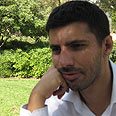

The figures compiled by Hod reveals that about half of religious homosexuals who underwent conversion treatments began leading a secular lifestyle, and about two-third of those who were married got divorced or are in the process of a divorce.
Hod founder Rabbi Ron Yosef presented data showing that the organization received 6,325 appeals since its establishment, 5,585 of them from haredi and religious homosexuals and 740 from parents, educators, counselors and professionals.
About 70% of the appeals came from the national-religious sector, and about 30% from the haredi and Hasidic sectors.
Faith crisis and self-hatred
The HOD organization initiated the seminar following a position paper on "conversion therapy" published earlier this year by the expert committee of the Israel Psychological Association.
According to the document, a patient should be presented with the existing knowledge, which warns against reparative therapy, but the possibility to change a person's sexual orientation should not be ruled out completely.
During the conference, Rabbi Yosef presented 291 testimonies of men who had undergone conversion treatments. Exact figures on the number of homosexuals who have undergone such treatments in Israel are unavailable, he told Ynet.
According to the rabbi, the only organization which supports such therapy is Rabbi Shlomo Aviner's Atzat Nefesh, which refuses to release exact figures.
"One of the reasons we established Hod about five years ago was because we began receiving evidence and complaints from people who had undergone conversion treatments," says Rabbi Yosef.
"About two years ago, we turned to the Israel Psychological Association and Health Ministry and asked them to address the issue. The Israel Psychological Association appointed an expert committee, which listened to the testimonies of professionals, therapists and patients and issued the position paper."
According to Rabbi Yosef, the 291 men who testified that they had undergone conversion therapy were asked to elaborate on the damage they had suffered as a result. A faith crisis was mentioned by most respondents. They also reported experiencing long periods of depression requiring medication, self-hatred and low self-esteem, as well as sexual dysfunction.
Another interesting figure is that out of the 291 men who underwent therapy, 165 began leading a secular lifestyle. In addition, 94 were married but only 36 remained married. The rest got divorced or are in the process of a divorce.
Eighty-two percent of those whose testimonies reached Hod are affiliated with Religious Zionism, 10% belong to the haredi sector, 7% are national haredi and 1% are from the Hasidic sector.
'Professional is not a missionary'
Dr. Gabi Weil, who headed the expert committee, presented the position paper to the conference participants. According to Weil, a professional must not allow his personal values to affect the patient's future in terms of treatment.
"A professional is not a missionary," Weil said. "It's problematic when a therapist with modern views tries to convince his patient that his beliefs are obsolete and wrong, but it's as problematic when a therapist tells his patient that if he hasn’t 'changed' it's because he doesn't want it enough or something of the kind."
According to Weil, the patient must not be given false promises and that the dangers and possible results of such a treatment must be put on the table.
'Halachic vagueness'
Prof. Tuvia Peri of the Department of Psychology Department at Bar-Ilan University said that his stance toward religious homosexuals had changed. In the past he believed that most of them could get married, but "today I realize from my long years of experience that this way of thinking causes a lot of damage."
He added, however, that each way had its price and that an absolute solution for the problem of homosexuality in the religious society had yet to be found.
Rabbi Yuval Cherlow, who concluded the conference, said that the homosexual orientation issue was subject to halachic vagueness. According to Cherlow, a lot of progress has been made on the issue in recent years from a public and social aspect, but there is no room for conclusive statements on the issue.















